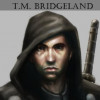When writing a story intended to be lengthy, is it better to have a single long
When writing a story intended to be lengthy, is it better to have a single long novel or a series?
I find myself contemplating often whether or not to turn my potentially very lengthy novel into a series. I have the story all laid out, and it could work quite well in divided sections which could either be their own novel, or just a new section in one complete book. I am afraid though that a long book would be daunting to a reader, and discourage them to commit to reading it. what do you think?It is best to write what is required for a satisfactory novel. Some stories are best told in one hit, some require a series, some just a trilogy. Only the author knows what the story takes, although the publishers and agents, who really are only interested in making money, may pretend that they know. It is oft times said that editors are failed or frustrated writer.
Hahaha MickS, I just love your comment, "...editors are failed or frustrated writer"s. Been there, done that. (It's way easier to edit than to write--shh). I agree--only the author really knows (gut feeling) whether a book/series is required. Cheers!
I love a series. But I also love a long novel! And what I really love is a long series of long novels!
What I think you should do - and I'm no expert, but I do know a tiny little bit about publishing - is write your story and send it to an agent or a publisher (probably an agent), and if they like it, they will know whether it will work (sell) better as a long novel or a series of shorter ones.
Mind you, knowing whether you're going to write a series or one long novel will affect the way you write it and what you decide to leave in or take out. It's a tricky one, without knowing anything about your story. I think it's something you'll have to make a decision on, because there's no right or wrong answer. If you decide to write a series it might give you more freedom and more scope. But you might like the fact that a long novel will have a definite end.
All I know is that my preference is for a long series of long novels - as long as they're good, of course!
Good luck with your decision
More brilliant insight from Lady Wordsmith! This is such good advice. I think I now know why my book never caught a publisher's eye for more than a second.
I believe, as I have also learned that if the story is one "story" with one theme than you do a novel. If the characters take on a different theme than it's another story which would mean a series. I hope that makes sense.
If you are writing a story about John, how he meets a girl and they end up getting married, no matter how long the story is, it should be one novel/story.
Then you are still writing about john but this time he goes to war and his marriage breaks up and he loses one leg and it's all about him and the war. This would be a sequel
John becomes a zombie is another sequel. Now I think I made more sense...lolthanks for your advice! It's more of a john has to find this piece to the puzzle and do this with it, now he's got to move on to the next piece - there's about four pieces! I like your example

You are welcome. Then maybe it's four stories you have there. I would say each piece of puzzle represents a separate theme. If you add new characters for each story it's even better. Make each piece reads like a different story.
Excellent analysis of the different types of books and conditions! Thanks for writing this--I'm printing this answer out for my own reference files. I didn't realize I had the same question. (Love the 'zombie sequel'... when's that one due out? LOL)
lol....I may just write that one myself...lol
This all depends on your end game. Do you intend to publish it as a series of novels, or short stories? You're absolutely right that readers will be intimidated by a thick book, but it's important to know that both agents and publishers will also be intimidated by it. I spent eight years writing a 230,000 word fantasy novel, only to get told by an agent that it was too big to market. There are books of that length on the market, but very few people in the industry will take a chance on one unless you already have publishing credentials. I would recommend doing some research on your genre and seeing what the typical word length is and shooting for that. If your book is actually the equivalent of like two or three books for that total, then I would highly recommend breaking it up.
M. T. Dremer, you bring up many good points! I never thought the publisher would be turned off by something out-of-the-norm by a newbie writer. Stephen King gets away with anything, but newbies should research, keep it simple and standard. Brilliant!
I find that following a family through its generations via a series of novels is more acceptable, but each book has to be complete, with its own beginning and ending. That might be a little difficult to accomplish, so I am just submitting an opinion.
Pennypines, we're all just submitting opinions--no need to apologize. Love your point about each book having to be complete, with its own beginning and ending! So many good comments on this question thread--thanks for commenting, too! Cheers!
Partly this also depends on if you are a well-known author or not. Publishers are leery about publishing a hugh book from an unknown writer. A way to split the difference is to offer it both ways and see which flies.
OH! Great idea--offering it both ways! I don't think anyone else has brought that up yet. How practical! Thanks for the comment (my wheels are spinning now).
I love reading. For me the idea that another book awaits be is too much to bear. I read the first book even faster.
However, I have also read books where the writer really did not need to break up a story, and it only made the store go on and on.
It does seem writers these days make their books into series. Sort of pre-selling for the next book…they get you hooked on book one, then you just have to buy and read book two or three.
Either way, I am going to read and read…to your success with your novel.Hear, hear! To your success with your novel or series or whatever you decide to make of it.
There is a wealth of information and guidance in these comments; thanks for asking the question--I've learned a lot, too! Maybe I'll get my first book out!
Some readers love their beloved story to go on and on. That's because the skills of the author make the story so readable.
And some stories are so painful to read that even a one-page short story would be too long.
I loved the first third of "Stranger in a Strange Land," but then the story bogged down for me. I loved the first half of Heinlein's "Number of the Beast," but it too bogged down. And then I read Hubbard's "Battlefield Earth" which was huge, even with a tiny font size. Most paperbacks are usually 400-500 pages (some even less), but this one was well over a thousand, and I loved it right to the end. I wanted it to be even longer.
Publishers usually don't publish long first novels. Economically, they are a risk. They take up the same amount of room as 2, 3 or 4 normal-sized novels on the book store shelf. And it's hard to charge more for the larger book, especially if the author is unknown.
If you self-publish, then this is less of a problem.
A series can be a good thing, especially if the first novel is compelling. You can make each book an event, like the release of each Harry Potter story, or each Twilight book.lone77star, so many good points you bring up--and I agree with them all, though I'd never put the thoughts together so succinctly before. You bring up a unique point about self-publishing being an option, too! I think that's what I need to do...
Related Discussions
- 11
Would it be better to pull a lengthy short story and republish it in parts?
by Wayne Barrett 12 years ago
Would it be better to pull a lengthy short story and republish it in parts?When fairly new to Hubpages, I posted a couple of very lengthy short stories, one of which was over 5k words. I was wondering if I should pull the stories and re post them in shorter parts to make them easier to read, but I...
- 18
If you are writing stories / novels, is it better to write in chronological orde
by Ceres Schwarz 12 years ago
If you are writing stories / novels, is it better to write in chronological order or out of order?Chronological order - chapter by chapter, scene by scene.Out of order - chapter 8, chapter 1, chapter 20, etc.Which is the better method? And what do you think are the advantages and disadvantages of...
- 9
I need help regarding a book I have been writing, it needs to be edited and publ
by medor 12 years ago
I need help regarding a book I have been writing, it needs to be edited and publishedHelp, the book it a romance/adventure type book, I have never tried to publish before. All the publishers I have found want money up front, which is not what I want to do.... thanks for any help you can give...
- 15
Why are lengthy Hubs discouraged when they might bring in more $$$ ?
by Frank Sanello 14 years ago
I don't know why HubPages and other ezines require short articles.Wikipedia must be the most referenced source on the Internet. That's because its articles are long and in-depth.If Wikipedia were a for-profit organization, its guesstimated worth would be $581 million, most of it from advertising. I...
- 10
Short Story or Novel? Where to Begin?
by Karen 13 years ago
I just read an article on the Mythic Scribes forum that was complaining how many new writers want to jump right in and write an epic novel (this IS a sci-fi/fantasy writer's forum) with no experience... suggesting maybe newbies would be better off sticking to the short story for a few years before...
- 19
Have there been any great novels out there that compare to "Gone With The Wind'?
by backporchstories 13 years ago
Have there been any great novels out there that compare to "Gone With The Wind'?Gone With The Wind has been both an epic book and movie. Since then it seems like all sagas after this one, have tried to master this great story. Do you know of any great novels that can top...















